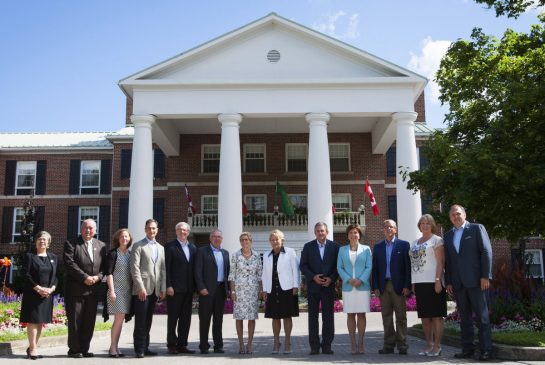Premiers discuss healthcare and pensions at Council of Federation Meeting
Senior’s care and retirement security were on the agenda at the July Council of the Federation meeting, a gathering of all the provincial and territorial premiers. The Healthcare Innovation Working Group, led by Saskatchewan Premier Brad Wall and Prince Edward Island Premier Robert Ghiz, is attempting to build on last year’s agreement to reduce the cost of six generic drugs by moving forward on issues of dementia and homecare. Ontario Premier Kathleen Wynn, this year’s CoF chair, called for CPP enhancement and renewed negotiations with the federal government on pension reform.
Attention turned towards the need for home care and medical imaging guidelines
Diagnostic imaging and senior’s care were the focus of the Healthcare Innovation Working Group, which includes provincial health ministers. The Premiers agreed to adopt guidelines for the use of medical imaging for minor head injuries, lower back pain, and headaches. The guidelines are expected to help eliminate unnecessary tests, improve patient care, and save approximately $220 million every year.
In addition to guidelines, the lack of home care for seniors was a concern for the Premiers. It has become common knowledge that seniors prefer to stay in their homes as long as they can and that there are clear benefits of home care for both seniors and the healthcare system. As a result, the Premiers committed the Working Group to look at efforts that prioritize homecare over long-term care institutions and identify and recommend innovative models. The premiers also addressed the concerns of the proliferation of dementia and would like to raise awareness as well as improve early diagnosis and treatment. Although no commitment or action was taken on the issue of homecare, it appears unanimous that more must be done.
Premiers consider the options for enhancing the retirement income system
Discussions around pension reform have been taking place for years, especially the debate over the expansion of the CPP. The Premiers agreed that there is a need to consider options for enhancing the retirement income system, inclusive of the CPP/QPP and PRPP. They looked at a modest, phased-in, and fully funded expansion of the CPP as a means to increase retirement income for future retirees. They also expressed concern over the increase in the age of eligibility of OAS and GIS from 65 to 67. As a result, the Premiers want the federal government to fulfill its commitment to compensate provinces and territories for additional costs to help people meet basic standards of living as a result of this eligibility change. Despite agreeing on the needs and issues around retirement income, there was no commitment to any action or implementation.
Provinces are stepping in the right direction but commitment and implementation are needed.
Provinces are stepping in the right direction despite the absence of their federal counterparts. At the last meeting in 2012, the premiers made headway in setting new prices for the six most common generic drugs (18% of the equivalent brand name drug), effective April 1, 2013, which results in $100 million in savings annually. Currently, 10 brand name drugs have been negotiated and an additional 17 drugs are going through negotiations, all of which is expected to save $60-70 million annually. In addition to the progress on drugs, several key recommendations were made, such as the recommendation to harmonize clinical practical guidelines, adopt team-based models of care, and improved health human resources management.
Despite pointing in the right direction and making meaningful cuts to drug costs, the Council of the Federation’s work is lacking the urgency of action Canadians expect on issues of national importance.
CARP calls for systemic improvements to the healthcare system and better retirement security for Canadians
CARP reached out to all the Health Ministers and Ministers of Finance prior to the Council of the Federation meeting. Currently, improvement is being done in a piecemeal fashion when larger “big picture” action is needed.
On the healthcare front, CARP is calling for an integrated continuum of post-acute healthcare that follows patients from first diagnosis or acute episode, through initial treatment, ongoing care, and through end of life needs. The current piecemeal approach by provincial leaders contributes to a fractured health system that leaves too many people without adequate care. Without a comprehensive approach to healthcare reform, the system will continue to fall short of effectively and sustainably meeting health care needs.
The same is true of retirement security. There is plenty of evidence that Canadians do not and cannot save sufficiently for retirement and many face financial hardship, which also puts pressure on the public purse. As a result, CARP is calling for a supplementary pension plan that is universal with mandatory participation with opt-out, has low fees, offers defined benefits, and has strong governance and accountability mechanisms. CARP is also calling for a modest CPP enhancement.
While the Canada’s premiers are moving in the right direction, comprehensive action is needed, on both health and retirement fronts. CARP will continue to advocate for comprehensive health and pension reform and report on the progress of the Premiers recommendations.
Read CARP’s health recommendations in its One Patient paper.
Read CARP’s pension reform recommendations in its Pension Reform brief.
Visit the Council of the Federation website


